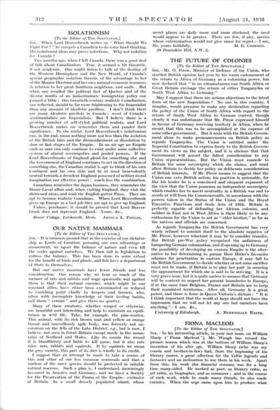OUR . NATIVE MAMMALS [To the Editor of THE SPECTATOR.] SIR,—It
is common ground that in the exercise of our dictator- ship as Lords of Creation, pursuing our own advantage or amusement, we upset the balance of nature and even tilt the scales against ourselves. We then call in legislation to redress the balance. This has been done to some extent for the benefit of birds and plants, and fish have a department of State to theinselves.
But our native mammals have fewer friends and less consideration. One reason why we hear so much of the menace of rats and rabbits and wage spasmodic war against them is that their natural enemies, which might be our constant allies, have either been exterminated or reduced to vanishing point chiefly by keepers and farmers, who, often with incomplete knowledge of their feeding habits, call them " vermin " and give them no quarter.
Many of these creatures, whether winged or otherwise,
are beautiful and interesting and help to maintain an equili- brium in wild life. Take, for example, the pine-marten. This animal, with its rich brown coat and yellow or orange throat and marvellously agile body, was formerly not un- common on the fells of the Lake District, e.g., but is now, I believe, not seen in Great Britain except rarely in the moun- tains of Scotland and Wales. Like its cousin the weasel it is bloodthirsty and liable to kill game, but it also eats mice, rats, rabbits and squirrels. If by squirrels we mean the grey variety, this part of its diet is wholly to its credit.
I suggest that an attempt be made to take a census of this and other of our less common mammals and that a nucleus of the rarer species should be protected in suitable natural reserves. Such a plan, is, I understand, increasingly favoured in America and Germany, and we have a Society for the Preservation of the Fauna of the Empire—exclusive - of Britain. In a small densely populated island, whose secret places are daily more and more disclosed, the need would appear to be greater. There are few, if any, species whose extermination would not give cause for regret.—I
Sir, yours faithfully, H. E. Cooxsori. 29 Downshire Hill, N.W. 3.






































 Previous page
Previous page